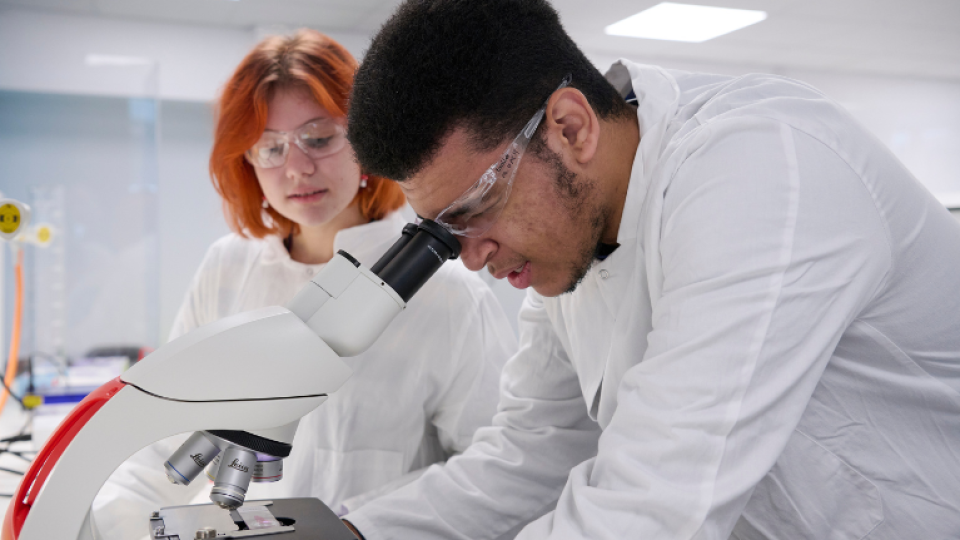
Microbiomes, environment and health
Microbiomes, environment and health
We are a multidisciplinary research group that studies interactions between human/livestock/environmental microbiomes and transmission of antimicrobial resistance (AMR) to develop interventions for public good, within the One Health approach.
Our research
We use whole genome sequencing to aid our understanding of the transmission and horizontal gene transfer in different related species and if they are transferable into human pathogens.
We also use metagenomic approaches to analyse the total microbial communities, specifically the relative abundance and diversity of AMR genes and their transmission dynamics between humans, animals and their associated environments.
We have wide experience in newly developed, low-input Oxford Nanopore sequencing technologies to provide an in-depth genomic analysis to identify novel or rare genetic features of relevant human and animal pathogens.
Our group develops new non-invasive tests for rapid pathogen and AMR detection (respiratory diseases) and new laboratory methods for both targeted and untargeted metagenomic sequencing to characterise "unculturable" gastrointestinal pathogens and linked AMRs, directly from clinical specimens (stool and gastric biopsy).
We also use whole genome sequencing and proteomics to develop broad host lytic bacteriophages and an ultra-rapid diagnostic Raman Spectroscopy platform, both aiming to combat antimicrobial resistance.
Our research also addresses climate change challenges as we develop low-emission feed and assess its efficacy, its potential and its impact on poultry gut microbial diversity, antimicrobial resistance and the occurrence of zoonotic pathogens.
Group members
Head of group
-
Professor Hermine Mkrtchyan
Professor of Microbiology and Head of ResearchSchool of Medicine and BiosciencesI use an interdisciplinary approach from laboratory to policy implementation to address challenges of antimicrobial resistance (AMR) that require concrete global efforts.
Research staff
- Dr Carol Davies Sala (Postdoctoral Research Associate)
- Dr Elaheh Ebrahimi (Research Assistant)
Postgraduate research students
- Oscar Previtali
- Molly Hales
- Filippos Vaskoudis
- Nam Giang Nguyen
- Julio Cesar Ortega Cambara
- Camila Espinoza-Sylvester
Current research themes
One Health approach:
- antimicrobial resistance
- microbiomes
- metagenetics
- whole genome sequencing
- Raman spectroscopy
Alternatives to antibiotics:
- bacteriophages
- probiotics
Current projects
Microbiomes, environment and health
The human microbiome plays many key roles in the smooth daily operations of the human body. Our bodies harbour several microbial communities that, constantly exposed to and challenged by the environment, exist simultaneously – e.g. in the mouth and throat, the gut, skin, nose, stomach and genitals – all of which constantly change across the life course.
However, how they develop and how they are impacted by the environment is not well understood. We use a multidisciplinary approach to understand the impact of the environment on microbiome and health.
Enhancing opportunities for low-biomass microbiomes
The current scientific debate of low-biomass microbial communities is far from settled and requires a rigorous investigation. Solving the technical challenges associated with the low-biomass microbiome samples is fundamental and crucial to improving our understanding of their role in health and disease.
We bring together knowledge and technological advances to develop improved protocols and pipelines to transform the microbiome science and provide a unique opportunity to solve real world problems and improve our ability to accurately diagnose diseases.
Developing broad host lytic bacteriophages via comparative genomics and in silico protein analysis
We use whole genome sequencing to explore the prophage content of clinical isolates to develop a fast-track approach for broad host bacteriophages.
Applying DNA sequencing for food safety
The microbiological safety testing of food is largely reliant on methods and standards developed decades ago. Recent microbiome research demonstrated a paradigm shift from traditional microbiology to genomics-based approaches. The COVID-19 pandemic has highlighted the value of DNA sequencing in the monitoring of pathogens.
We seek to explore the potential for innovative sampling techniques and DNA sequencing-based methodology to improve food microbiology testing.
Deciphering indoor air microbiomes
Indoor public places are often crowded, making social distancing difficult. Such contained spaces – especially if they have inappropriate levels and methods of air handling and hygiene practices – they might become incubators of pathogens.
We utilise new metagenomic methodologies and bioinformatics tools to comprehensively investigate the role of indoor air microbiomes as a vector for the transmission of AMR pathogens between humans and the environment.
Climate change and microbiomes
Climate change presents an existential global crisis that impacts people, environments and economies worldwide. To halt warming, we will need to reduce emissions by 75% and massively increase biodiversity across the planet. We develop low emission feed and assess the efficacy and potential in vivo trials and its impact on gut microbial diversity, antimicrobial resistance and the occurrence of zoonotic pathogens.
Developing approaches to avoid antibiotic overuse in COPD
To reduce burden and improve clinical symptoms, almost all patients with chronic obstructive pulmonary disease (COPD) and exacerbations are often prescribed long-term antibiotic regimes.
Choosing this approach, however means that many patients may well receive unnecessary antibiotics, promoting selective pressure and antibiotic resistance, which is a public health concern globally. The problem worsens because many of the bacteria responsible for the infection are resistant to multiple antibiotics.
We develop non-invasive tests and approaches using novel sequencing technologies able to achieve rapid pathogen and AMR detection and reduce unnecessary antibiotic use.
New metagenomic applications for the identification and characterisation of "unculturable" gastrointestinal pathogens
We develop new methodologies for both targeted and untargeted metagenomic sequencing of faeces and gastric biopsy specimens, using the latest high accuracy ONT and Illumina short read deep sequencing to characterise gastrointestinal pathogens (Campylobacter and Helicobacter) and linked AMRs, directly from clinical specimens (stool and gastric biopsy).
Development of an ultra-rapid microbiology diagnostic Raman spectroscopy platform
Working with our commercial partner, we are developing an ultra-rapid microbiology diagnostic Raman spectroscopy platform aimed at combating antimicrobial resistance.
PhD projects, topics and interests
We invite PhD applications for all above research themes.
-
Research degrees with the School of Medicine and Biosciences
Current PhD opportunities in the School of Medicine and Biosciences
Publications
-
Book chapters
Haroun N Shah, [...], Hermine V Mkrtchyan. 2020. MALDI TOF MS and currently related proteomic technologies in reconciling bacterial systematics. In: Trends in the Systematics of Bacteria and Fungi. Bridge, Paul, Smith, David and Stachebrandt, EErko. Eds. CAB Internationa, Wallingford, UK. ISBN 9781789244984.
Serafim V, Xu Z, Mkrtchyan HV et al. Chapter 15: ‘Determination of Antimicrobial Resistance using Tandem Mass Spectrometry’. In " MALDI-TOF and Tandem MS for Clinical Microbiology". Wiley, 2017.
Xu Z, Olkun A, Vranckx K, Mkrtchyan HV, et al. Chapter 21B: ‘Subtyping of Staphylococcus spp. Based upon MALDI-TOF MS Data Analysis’. In "MALDI-TOF and Tandem MS for Clinical Microbiology". Wiley, 2017.
-
Publications (*corresponding author)
Rory Cave, Mary Ter-Stepanyan, Hermine V Mkrtchyan*. 2023. Short and long read sequencing revealed the detection and evolution of an IncF plasmid harbouring blaCTX-M-15 and blaCTX-M-27 genes in Escherichia coli ST131. Microbiology Spectrum. https://doi.org/10.1128/spectrum.00356-23
Jie Sheng, Rory Cave, Mary M Ter-Stepanyan, Nune Kotsinyan, Jiazhen Chen, Taijiao Jiang, Hermine V Mkrtchyan*. 2023. Whole genome sequencing and comparative genomics analysis of a newly emerged multidrug resistant Klebsiella pneumoniae ST967. Microbiology Spectrum. https://doi.org/10.1128/spectrum.04011-22
Rory Cave, Nune Kotsinyan, Mary Ter-Stepanyan, Hermine V Mkrtchyan*. 2022. UroPathogenic and Extended spectrum beta-lactamase Escherichia coli ST127 belonging to a new emerging lineage containing unique genetic adaption for urinary tract infections from remints of prophage insertion regions. Microbiology Spectrum. http://doi.org/10/1128/spectrum.02511-22
El-Deeb W, Cave R, Fayez M, Alhumam N, Quadri S, Mkrtchyan HV. 2022. Methicillin resistant staphylococci isolated from goats and their farm environments in Saudi Arabia genotypically linked to known human clinical isolates: a pilot study. Microbiology Spectrum. https://doi.org/10.1128/spectrum.00387-22
Cole JA, Dodds K, Ayikoru M, Mkrtchyan HV. 2021.Unpacking vaccine ‘hesitancy’: the spectrum of vaccine acceptance. BMJ. https://blogs.bmj.com/bmj/2021/10/05/unpacking-vaccine-hesitancy-the-spectrum-of-vaccine-acceptance/
Cole J, Dodds K, Ayikoru M, Mkrtchyan HV. Critical Health Geopolitics: (Un)healthy Spaces During the COVID-19 Pandemic. The UNESCO Social Sciences and COVID 19 pandemic. 2021
Rory Cave, Raju Misra, Jiazhen Chen, Shiyong Wang, Hermine V Mkrtchyan*. 2021. Comparative genomics demonstrated a link between staphylococci isolates from different sources; A Possible public health risk. Frontiers in Microbiol. https://doi.org/10.3389/fmicb.2021.576696
Cave R, Cole J, Mkrtchyan HV*. 2021. Surveillance and prevalence of antimicrobial resistant bacteria from public settings within urban built environments: Challenges and opportunities for hygiene and infection control. Review. Environment International. DOI: 10.1016/j.envint.2021.106836
Arman R. Badalyan., M.G. Hovhannisyan, G.N.Ghavalyan, Mary M. Ter-Stepanyan, Rory Cave, Jennifer A. Cole, Andrew W.K.Farlow, Hermine V. Mkrtchyan*. 2021. The knowledge and attitude of physicians regarding vaccinations in Yerevan, Armenia: Challenges for COVID-19. Vaccines 9(10), 1188; https://doi.org/10.3390/vaccines9101188.
El-Deeb W, […], Mkrtchyan HV. 2021 The effect of staphylococcal mastitis including resistant strains on serum procalcitonin, neopterin, acute phase response and stress biomarkers in Holstein dairy cows. PeerJ.9:e11511.
Xu Z, Li X, Tian D, Sun Z, Guo L, Dong C, Tang N, Mkrtchyan HV*. 2020. Molecular characterization of methicillin-resistant and -susceptible Staphylococcus aureus recovered from hospital personnel. J Med Microbiol. doi: 10.1099/jmm.0.001272. Epub ahead of print. PMID: 33180019.
Xu Z, Cave R, Chen L, Yangkyi T, Liu Y, Li K, Meng G, Niu K, Zhang W, Tang N, Shen J, Mkrtchyan HV*. 2020. Antibiotic resistance and molecular characteristics of methicillin-resistant Staphylococcus epidermidis recovered from hospital personnel in China. J Glob Antimicrob Resist. 22:195-201.
El-Deeb W, Fayez M, Elsohaby I, Mkrtchyan HV, Alhaider A. 2020. Changes in blood biomarkers in Arabian horses with Clostridium difficile-induced enterocolitis. Comp Immunol Microbiol Infect Dis. 73:101525. doi: 10.1016/j.cimid.2020.101525. Epub 2020 Aug 7. PMID: 32877870.
El-Deeb W. Elsohaby I, Fayez M, Mkrtchyan HV, El-Etriby D, ElGioushy M. 2020. Use of procalcitonin, neopterin, haptoglobin, serum amyloid A and proimflammatory cytokines in diagnosis and prognosis of bovine respiratory disease in feedlot calves under field conditions. Acta Trop. doi: 10.1016/j.actatropica.2020.105336.
Zhen Xu, Jiazhen Chen, Kostas Vougas, Haroun Shah, Raju Misra, Hermine V Mkrtchyan*. 2019. Comparative proteomic profiling of methicillin susceptible and resistant Staphylococcus aureus. Proteomics 2020, 20, 1900221. doi: 10.1002/pmic.201900221.
Jamrozy D, Misra R, Xu Zhen, Ter-Stepanyan MM, Karapetyan HD, Hambardzumyan ADz, Mkrtchyan HV*. 2019. Novel methicillin-resistant Staphylococcus aureus CC8 clone carrying SCCmec V with high similarity to element from coagulase negative staphylococci identified in a hospital setting in Armenia. Front. Microbiol. https://doi.org/10.3389/fmicb.2019.01592
Cave R, MisraR, ChenJ, WangS, Mkrtchyan HV*. 2019. Whole genome sequencing revealed new molecular characteristics in multidrug resistant staphylococci. Nature Sci. Reports. DOI : 10.1038/s41598-019-45886-6.
Xu Zhen, Raju Misra, Gavin K Paterson, Ronald R Cutler, Mark A Holmes, Saheer Gharbia, Mkrtchyan HV*. 2018. Whole genome sequence and comparative genomics analysis of multi-drug resistant environmental Staphylococcus epidermidis ST59. G3: Genes, Genomes, Genetics. https://doi.org/10.1534/g3.118.200314.
Zhen Xu, Haroun N Shah, Raju Misra, Jiazhen Chen, Wenhong Zhang, Yuting Liu, Ronald R Cutler, Hermine V Mkrtchyan*. 2018. The prevalence, antibiotic resistance and mecA characterization of coagulase negative staphylococci recovered from non-healthcare settings in London, UK.
Antimicrobial Resist & Inf Control. DOI : 10.1186/s13756-018-0367-4.Mkrtchyan HV*, Zhen X, Yacoub M, Ter-Stepanyan MM, Karapetyan HD, Cutler RR, Kearns AM, Pichon B, Hambardzumyan ADz. 2017. Detection of diverse genotypes of methicillin resistant Staphylococcus aureus from hospital personnel and the environment in Armenia. Antimicrob Resist & Inf Control. 6:19.doi: 10.1186/s13756-017-0169-0. https://aricjournal.biomedcentral.com/articles/10.1186/s13756-017-0169-0
Mkrtchyan HV, Xu Zhen, Cutler RR 2015. ‘Diversity of SCCmec elements in environmental staphylococci. BMC Microbiology 15:120; doi:10.1186/s12866-015-0451-3. https://bmcmicrobiol.biomedcentral.com/articles/10.1186/s12866-015-0451
Zhen X, Mkrtchyan HV*, Cutler RR 2015. Antibiotic resistance and mecA characterization of coagulase-negative staphylococci isolated from three hotels in London, UK. Front. Microbiol. 09 September. http://dx.doi.org/10.3389/fmicb.2015.00947http://journal.frontiersin.org/article/10.3389/fmicb.2015.00947/full
Mkrtchyan HV, Russell CA, Wang N, Cutler RR 2013. "Can public restrooms be an environment for bacterial resistomes?" PLoS ONE 8(1): e54223. doi:10.1371/journal.pone.0054223. http://journals.plos.org/plosone/article?id=10.1371/journal.pone.0054
Mkrtchyan HV, Cutler R. 2012. Identification of mecA genes in environmental staphylococcal isolates. International journal of infectious diseases vol. 16, 426.
Mkrtchyan H*, Gibbons S, Heidelberger S, Zloh M, Khalatbari Limaki H 2010. Purification, characterization and identification of acidocin LCHV, an antimicrobial peptide produced by Lactobacillus acidophilus n.v. 317/402 strain Narine. Int. J. Antimicrob. Agents, 35 (3): 255-260.
Mkrtchyan HV. 2013. An importance of good hygiene. Microbiologist.
Mkrtchyan H. 2011. New dedicated infection control service for schools. Independent Education Today. Issue 21, p. 13.
Mkrtchyan H. 2011. Hands on protection for schools. Independent Education Today. Issue 22.
-
Conference papers
O. Privitali, Cuber P, Misra R, Ali S, Mkrtchyan HV. Solutions to unlock low-biomass air microbiome for public health pathogen and AMR surveillance using metagenomics. ECCMID 2024. Barcelona, Spain. Invited talk.
Piotr Cuber, Oscar Previtali, Mark Alston, Pia Aanstad, Darren Heavens, Darren Chooneea, Samuel Martin, Shanom Ali, Richard M. Leggett, Matthew D. Clark, Hermine V Mkrtchyan, Raju Misra
Air metagenomics – solutions and opportunities to unlock airborne biomes for public health. UKHSA 2024. London, UK.
O. Privitali […], Mkrtchyan HV. Comparison of matrix assisted laser desorption ionization-time of flight mass spectrometry (MALDI-ToF-MS) vs. metagenomic sequencing (Nanopore sequencing) for the assessment of surfaces in healthcare facilities in outbreak situations. ECCMID 2023. Copenhagen, Denmark.
R. Cave […], Mkrtchyan HV. The detection and evolution of an IncF plasmid type harbouring both blaCTX-M-15 and blaCTX-M-27 genes from Escherichia coli ST131. ECCMID 2023. Copenhagen, Denmark.
R. Cave […], Mkrtchyan HV. CC5 MRSA isolates from goats and the farm environment in Saudi Arabia phylogenetically linked to isolates recovered from humans in clinical samples from the USA and Europe ECCMID 2022. Lisbon, Portugal.
Cole J, Dodds K, Ayikoru M, Mkrtchyan HV. Critical Health Geopolitics: (Un)healthy Spaces During the COVID-19 Pandemic. UNESCO: Social Sciences and COVID 19 pandemic. October 2021. Paris, France.
Cole JA, Dodds K, Ayikoru M, Mkrtchyan HV. 2021.Unpacking vaccine ‘hesitancy’: the spectrum of vaccine acceptance. British Medical Journal.https://blogs.bmj.com/bmj/2021/10/05/unpacking-vaccine-hesitancy-the-spectrum-of-vaccine-acceptance/
Zhen Xu, Tsetan Yangkyi,Liqin Chen, Yuting Liu, Jiazhen Chen, Ge Meng, Kaijun Niu, Wanqi Zhang, Jun Shen, Hermine V Mkrtchyan. Molecular characterization of Staphylococcus epidermidis recovered from healthcare personnel in a hospital in Tianjin, China. ECCMID 2019. Amsterdam, Netherlands.
Cave R, Misra R, Mkrtchyan H. Whole genome sequencing (WGS) to unveil the molecular epidemiology of S. haemolyticus. ECCMID 2019. Amsterdam, Netherlands.
Cave R, Serafm V, Sellami L, Shah A, Mkrtchyan H, Shah H. Comparative MALDI-TOF analysis of Staphylococcus spp. from the Environment including Antibiotic Resistant Strains. MSACL 2018. Salzburg, Austria.
Cave R, Misra R, Mkrtchyan H. Diversity of SCCmec elements recovered from high-frequency hand-touched areas from general public setting from East and West London. ECCMID 2018. Madrid, Spain.
Zhen Xu, Fin Ming, Haroun Shah, Ajit Shah, Mkrtchyan HV*. Comparative proteomic analysis of a wild type S. aureus, mecA negative strain grown in the presence and absence of oxacillin. IC2AR 2017. Invited Lecture. Lisbon, Portugal.
Zhen Xu, Kathleen Vranckx, Haroun Shah, Ronald R Cutler, Bruno Pot, Hermine V Mkrtchyan. Mass spectra-based systematics analysis of antibiotic resistant environmental staphylococci. ECCMID 2016. Amsterdam, Holland.
Xu Zhen, Raju Misra, Mkrtchyan HV, Ronald R Cutler, Saheer Gharbia, Gavin K Paterson. Whole genome sequencing has revealed the transmission of antibiotic resistance and virulence genes in Staphylococcus epidermidis. ECCMID 2016. Amsterdam, Netherlands.
Mkrtchyan HV, Cutler RR, Zhen X, Kearns AM, Pichon B, Yacoub M, Hambardzumyan ADz, Ter-Stepanyan MM, Karapetyan HD. Characterisation of Methicillin resistant Staphylococcus aureus from hospital personnel and the environment in Armenia. ECCMID 2015. Copenhagen, Denmark.
Xu Zhen, Hermine V Mkrtchyan, Ronald R Cutler. Widespread distribution of multidrug resistance in community associated staphylococci. FEMS 2015. Maastricht, The Netherlands.
Xu Zhen, Hermine V Mkrtchyan, Ronald R Cutler. Molecular characterization of methicillin-resistant coagulase negative Staphylococci isolated from environment. ESCMID 2014. Barcelona, Spain.
Wang N, Mkrtchyan HV, Cutler RR. Rapid method to measure gaseous exchange from bacteria undergoing treatment of different antimicrobial/disinfectant agents in real time. FEMS 2013. Leipzig, Germany.
Wang N, Nürnberg DJ, Mkrtchyan HV, Cutler RR. Survival and biofilm formation of multidrug resistant and multidrug susceptible environmental staphylococci. FEMS 2013. Leipzig, Germany.
Mkrtchyan HV, Cutler RR. The diversity of SCCmec elements found in environmental staphylococci. ESCMID 2013. Invited talk. Berlin, Germany.
Mkrtchyan HV, Cutler RR. The discovery of EMRSA-15 in environmental staphylococci isolates. IMED-2013. Vienna, Austria.
Mkrtchyan HV, Cutler RR. Determination of mecA and PVL carriage in a methicillin susceptible Staphylococcus aureus isolated from a public washroom. ICAR 2012. Lisbon, Portugal.
Mkrtchyan H, Cutler R. Identification of mecA gene in environmental Staphylococci isolates. ISID 2012. Bangkok, Thailand.
Mkrtchyan H, Cutler R. Multiply drug resistant coagulase negative staphylococci isolated from public toilets. FEMS 2011. Geneva, Switzerland.
-
Public engagement/media
The MailOnline 2021: 'Long-term social distancing' could curb rise of antibiotic-resistant superbugs but it would ruin the economy’.
The conversation 2019: We found reservoirs of antibiotic resistant bacteria across London.
ITV News 2019: 'Disturbing levels' of antibiotic-resistant bacteria found in public areas in London’.
BBC Science Focus 2019: Antibiotic resistance: is it really as bad as climate change?
New Scientist 2019: London’s public spaces are rife with multidrug-resistant bacteria.
Reuters 2019: Superbugs found lurking in London underground and hospitals.
Scientific America 2019: Mind the Staph: London Is Crawling with Antibiotic-Resistant Microbes.
Contact us
Professor Hermine Mkrtchyan
- School: School of Medicine and Biosciences
- Address: University of West London, London, W5 5RF, UK
- Email: Hermine.Mkrtchyan@uwl.ac.uk
Find out more
-
Research Centres and Groups
Find out about our multi-disciplinary areas of expertise, PhD research, and teaching.
-
Research impact
Learn how our PhD research has helped communities locally, nationally and internationally.
-
The Graduate School
If you are interested in studying for a PhD or Professional Doctorate, the Graduate School is here to support your research.

















